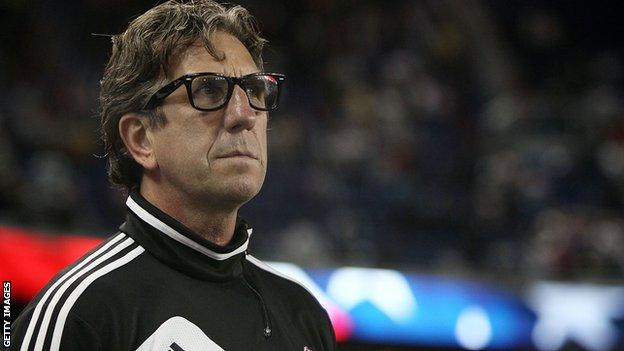Paul Mariner: Former Ipswich and England striker dies aged 68
- Published

Paul Mariner scored 13 goals in 35 appearances for England
Former England striker Paul Mariner, who won the FA Cup and Uefa Cup with Ipswich Town, has died aged 68.
Mariner began his league career at Plymouth Argyle and also played for Arsenal and Portsmouth.
He made 35 appearances for England, scoring 13 goals.
"We regretfully inform you that Paul passed away peacefully on 9 July surrounded by his family, after a brief battle with brain cancer," said a statement from Mariner's family.
"We would like to thank all the people who came to see him through his illness for their support and the messages that were sent to him; they meant a great deal to him and us.
"A special thank you must go to the NHS and the unbelievable care that he received when he most needed it and for that we, as a family, will be forever in your debt.
"Paul lived a full life and was fortunate enough to represent a group of fantastic football clubs as well as his country, all of which meant the world to him.
"Anyone who knew Paul will attest to his fantastic sense of humour, his passion for life and his work. He will be sorely missed by everyone who was ever around him and by those most close to him."
Lancashire-born Mariner made 155 appearances and scored 61 goals for Plymouth, who signed him from non-league Chorley in 1973.
He moved to Ipswich in 1976 and was part of the side who won the FA Cup in 1978 and Uefa Cup in 1981 under manager Sir Bobby Robson.
Mariner scored 135 goals in 339 appearances for the Portman Road side before joining Arsenal in 1984. He joined Portsmouth two years later and finished his playing career in the United States.
He made his England debut in 1977 and played for his country at the 1982 World Cup.
Mariner also had spells as manager of Plymouth and Major League Soccer side Toronto FC.
"The Argyle family is devastated to learn of the passing of legendary former striker and manager, Paul Mariner," said the Pilgrims.
Ipswich inducted "true great" Mariner into the club's hall of fame in 2011.
"It's incredibly sad news and the thoughts of everyone at the club are with Paul's family and friends at this very difficult time," said Ipswich chief executive Mark Ashton.
'Brave as well as skilful - Mariner one of the finest of his time'
BBC Sport chief football writer Phil McNulty
Paul Mariner was a striker of the highest class who mixed the old-fashioned virtues of physical presence and aerial power alongside a complete all-round game.
He will be remembered as one of Sir Bobby Robson's most astute acquisitions when he moved to Ipswich Town from Plymouth Argyle in 1976, going on to become a key figure in their greatest period.
Mariner played in the FA Cup final win against Arsenal in 1978 and also when Ipswich Town won the Uefa Cup in 1981, scoring in the first leg of a 5-4 aggregate win over AZ Alkmaar.
It was a regret that Ipswich Town did not win the title despite coming close during his time at the club but Mariner's consistency, goals, character and outgoing personality made him one of their true legends of a golden era in Suffolk under Robson.
Mariner's quality earned him England honours, the high point of his international career coming when he scored in the 3-1 win over France at the 1982 World Cup in Spain.
He mixed modern attributes, was brave as well as skilful and at his peak was one of the finest British centre-forwards of his time.
Allow X content?
This article contains content provided by X. We ask for your permission before anything is loaded, as they may be using cookies and other technologies. You may want to read X’s cookie policy, external and privacy policy, external before accepting. To view this content choose ‘accept and continue’.